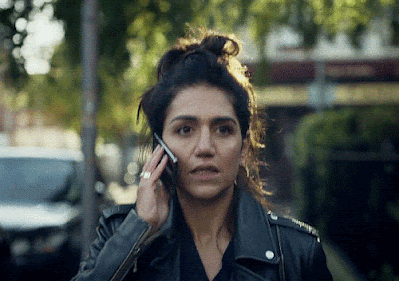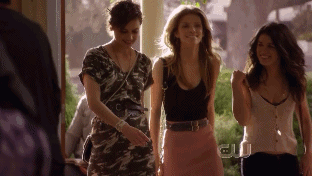“Whatcha got there, Margie?” seems like a strange choice for
the most memorable line from the 1996 film, Fargo. A lot of crime goes on in that story, all
against the backdrop of the snowy Minnesota landscape, but it’s the charming local
accents and the banal interest in what people are having for their meals that
has stayed with me to this day. That
said, I only saw the film during my university years in the early 2000s, during
a period in which I felt the best way to round out my terrible personality was
to make sure I had seen all those classic films people talk about. Back in the days of DVDs, Fargo was easily
procured from a now-defunct online rental company, viewed on a laptop intended
for academic support, and sat through with an attention span that now seems alien
as these were also the days that predated smartphones and their irresistible
whispers of distraction when you are trying to concentrate on absolutely anything
at all.
Fast forward to 2014 and, a mere 18 years after the film’s
release, a TV spin off emerges. I’ve chosen
the word spin off, as it really cheapens the programme, making it clear where
the quality lies in this originator-progeny relationship. Pah, I thought to myself, I shan’t ever be
watching that. But join me, if you will,
in 2021. More advanced in age, with
greater maturity and self-assurance than my student self from decades before, I
was no longer pursuing self-betterment through lists of must-see movies. Oh no, I was looking at the IMDb list of top-rated television
programmes. And this is called growth. There, at 38 (rankings may change over time)
and with a score of 8.9/10, was the previously ignored Fargo
TV series. Well, this omission needed
rectifying. What kind of wildly
successful TV blog would this
be if, while having sat through the vast majority of top scorers (don’t worry, they’re
all covered here, guys, from Rick & Morty
to Our Planet) I allowed this oversight to
continue? And lo, thanks to Netflix,
three quarters of my neglect has been rectified.
From my vantage point of having seen three of Fargo’s four
seasons, I shall now offload all my thoughts and opinions for you to read. Unfortunately the fourth series emerged while
I was otherwise preoccupied and I haven’t been able to track it down on a platform,
so we’ll just pretend we don’t care (though I truly do as it looks like a
ripping period production with casting that finally offsets Fargo’s
overwhelming whiteness). But what I can
say is that those first three outings of this boxset are cracking viewing to
put in front of your face – how wrong I was about not expecting much from the
TV version of a film. What’s more, the
stellar cast just goes to show how far TV has come in taking on cinema as the home
of the big acting name or indeed of the quality production.
Each episode of Fargo is exquisitely crafted. From the first frame, care and attention has
been taken over every detail, as if all of it is a pilot that wants you to like
it. It’s how telly should be. This is made all the more impressive by the
fact that so much of it is shot in temperatures below freezing, as I can only
imagine cameramen wanting to get out of the cold and therefore not really
caring a toss. I also like to think of
everyone slipping over in the ice during the outtakes. Not because I wish them ill, but because I am
the sort of person that slips in ice, so I might as well assume it’s a universal
quality. One curious feature of our
storytelling is that every instalment is preceded by a statement that the
events are based on a true story, but that names have been changed to protect
identities. There’s no way of checking
this as I simply cannot be bothered to type it into the internet, so again, we
can just sit with it, wondering if we believe it, wondering if it matters,
before moving on.
It’s pertinent, though, as the plots in Fargo are delightfully
far-fetched. To me, this is proof of veracity. Honestly, you couldn’t make this stuff
up. Right? Each series tracks over its ten episodes a
wholly different storyline. This means
you’ll need to jettison an old cast and get to know a new one. Gradually, hints of how these worlds and
timelines connect are revealed, with series two’s seventies setting engendering
an aftermath that plays back into the first series, which in turn has
repercussions on the third. May I one
day know how this comes to bear on the fourth.
Playing out over the real towns of Minnesota and the
Dakotas, our cast is often split into three camps. We have heroes, often nice folk with above-average
yet underappreciated ability in their jobs, normally law enforcement, who have
to put up with the nonsense that swirls around them. These are our Margies, carrying a torch of
affection over from our original film.
Then we have our malcontents.
Their morals are often dubious, yet we can’t resist rooting for
them. They’ve faced hardship and come out
stronger, but their drive and effort often lead to their own downfalls. And then we have some great straight-up
baddies, doling out evil willy nilly, creating the murderous rampages and bloodstains
in the snow that are required to propel much of the plot forward.
I’d venture to describe Fargo as gently soothing, even
though it’s awash in ultraviolence.
Somehow, the gruesome gore is easy to forgive, maybe because it’s framed
in a higher art form. We have a top-notch
ratio of intrigue resolution to new curiosity establishment in each episode, as
well as exemplary season finale crescendoing that resulted in my own patented
viewing strategy: episodes nine and ten of each series had to be back-to-backed
simply because I would get so excited (what a sad
little life, Jane). I typically only
ever watch one instalment of a drama at a time so it doesn’t become wallpaper,
but don’t worry if you have an alternative approach – it just means I am better
than you.
So come all and feast upon this ensemble masterpiece. You’ll revel at whatshisface off that film
once and whoshername that used to be in thingy.
Not everyone masters the accent as successfully as others, and all the “oh
yah”s and “ok then”s are a crucial part of our charm requirements, but each player
has a great time with their character.
There’s bold storytelling as far as the eye can see, and dusting
everything else in snow covers a variety of other flaws that I simply didn’t notice. So take a trip via your screen of choice to
this slice of the USA and treat yourself to some of the nicest murder stories
ever known.



















































